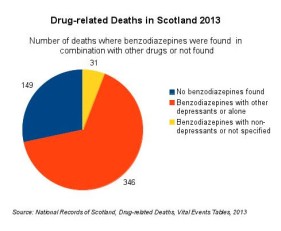Benzodiazepines are present in a high proportion of Scottish drug related deaths, but judged to have contributed to less than half of the deaths. Further investigation suggests that benzodiazepines may be contributing to more deaths than currently reported.
Figures for drug related deaths from the National records of Scotland (NRS) show that in 2013 benzodiazepines were found in more drug-related deaths than all other reported drugs. Of a total 526 deaths, benzodiazepines were found in 377 (71.6%) and judged to have contributed to 149 (28.3%) of those deaths.
In 2008, it became a requirement that all the drugs found in drug-related deaths be reported, (before 2008, only drugs which were thought to be implicated needed to be reported).
Since 2009, pathologists have also been asked to report which drugs contribute to each death as well as all the drugs found in the bodies. From 2008 to 2013, deaths where benzodiazepines were found outnumbered deaths where they were implicated by > 2:1.

Fig 2. Increase in benzodiazepines reported in drug deaths after 2007 & divergence between those found & those implicated, 2008 – 2013
It is unclear whether the other UK countries differentiate between the drugs found and those implicated in the same way as Scotland. Figures for drug deaths in England, Wales and Northern Ireland do not present separate data for the two categories. Benzodiazepines reported in drug deaths in England and Wales vary; 7% (2012) from the Office for National Statistics and 26.6%; 37.7% from the National Programme on Substance Abuse Deaths (NPSAD) for England and Wales respectively (2012) and 38.2%(2013) in Northern Ireland from the Northern Ireland Statistics and Research Agency (NISRA).
BENZODIAZEPINES FOUND WITH OTHER DEPRESSANTS
“Benzodiazepines potentiate the effects of other central nervous system depressants taken concomitantly.” British National Formulary
Benzodiazepines can increase the risk of fatal overdose if taken in combination with other depressant drugs. Methadone, heroin/morphine and alcohol are the other depressant drugs reported to the NRS.
The ACMD report: Reducing Drug Related Deaths (2000) stressed the high proportion of drug related deaths in which benzodiazepines taken in combination with other depressants were implicated and in 1999 recommended that all benzodiazepines should be rescheduled to schedule 3.
It has been suggested that benzodiazepines are merely a feature of drug-related deaths, ie. they are present in fatal overdoses, but have not contributed to them. The findings of a case-controlled study commissioned by the National Treatment Agency (NTA) in 2007 shows this is not the case. The study found that benzodiazepines increase the risk of fatal overdose when taken with opioids by 2.5 times and with methadone by nearly 10 times.
There is also a wide variation in individual response to benzodiazepines. For instance, there is a 30-fold variation in plasma concentration between individuals when given the same dose of diazepam.[1] This suggests that there may be no safe dose when benzodiazepines are mixed with other depressants.
FINDINGS FROM INDIVIDUAL DEATHS

- Fig 3.Deaths where benzodiazepines found combined with other depressants, with non-depressants or not present (2013).
The details of individual deaths in Scotland, the drugs found and whether they were implicated are available in the GROS Vital Events Tables (table 6.12). When the information on each drug related death in 2013 was examined, it showed benzodiazepines had been taken in combination with other depressants in more deaths than they were implicated in.
Figure 3 shows that of the 526 drug-related deaths in 2013, benzodiazepines were found with other depressants or alone in 346 deaths (70.2%), with non-depressant drugs in 14 (2.3%) deaths and no benzodiazepines were found in 161 (27.5%) deaths.
CONCLUSION
Since 2008 in Scotland, Reporting all the drugs found present in the body reveals that benzodiazepines are present in more deaths than previously reported. It also shows that in a large proportion of deaths where benzodiazepines have been taken in combination with other depressant drugs, pathologists have excluded them as a contributory factor.
In 2013, Benzodiazepines were found in 377 (71%) of Scottish drug related deaths and implicated in 149(28.3%) of of those deaths. The above suggests that in the 228 (43.3%) deaths where benzodiazepines had been taken with other depressants (but not implicated), they could have contributed them. If this is the case, rather than 28.3% of deaths, benzodiazepines could have contributed in up to 65.7% of the deaths.
If the true contribution of benzodiazepines to drug-related deaths is being underestimated, it would be useful to know on what criteria pathologists are basing their findings when benzodiazepines are found in combination with other depressants in a drug-related death.
Reference
1. Factors Influencing the Metabolism of Diazepam, Leif Bertilsson, Thomas A. Baillie, and Jesus Reviriego, Department of Clinincal Pharmacology at the Karolinska Institute, Huddinge Hospital, S-141 86, Huddinge, Sweden. Pharmac. Ther Vol. 45. pp. 85-91. 1990.

